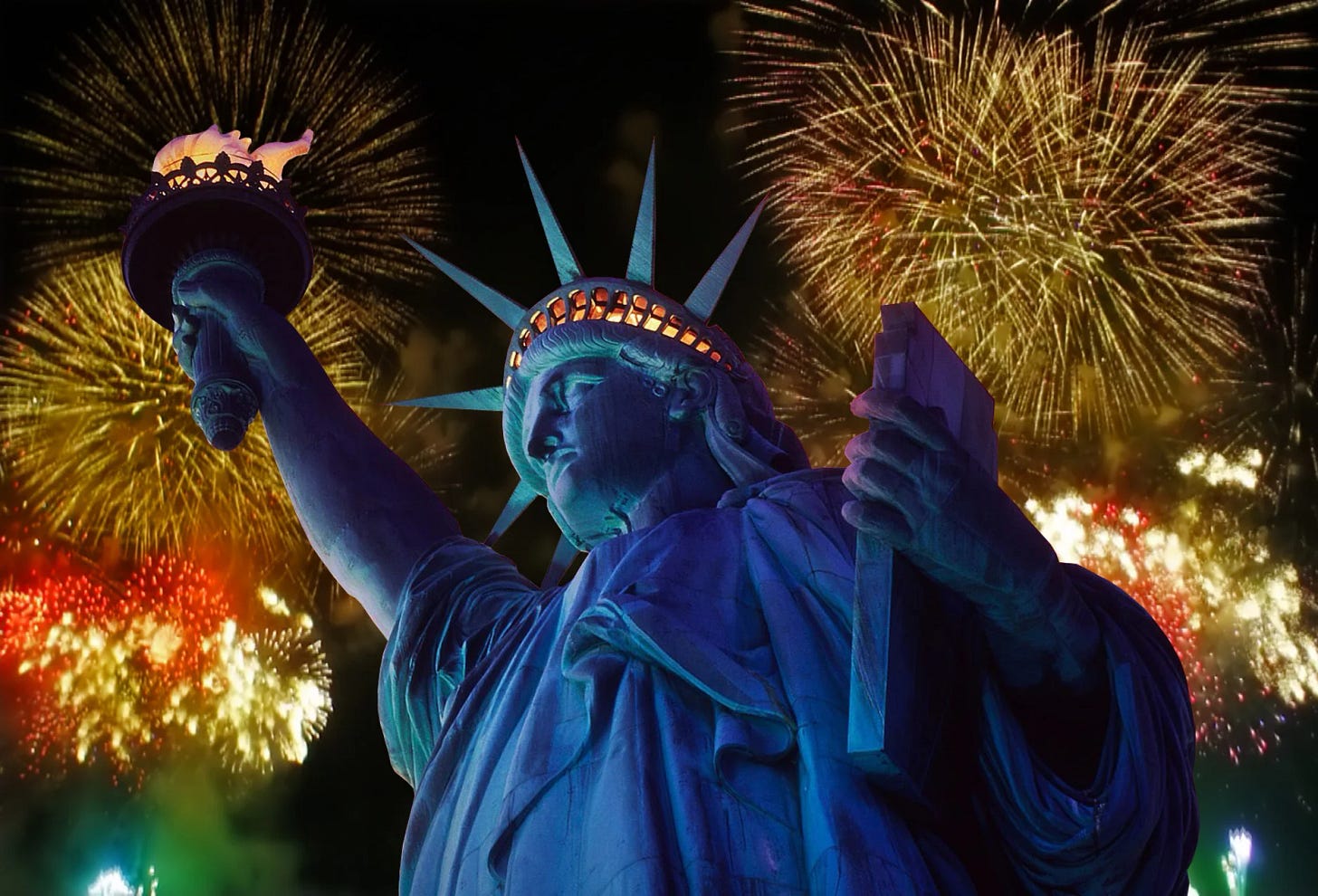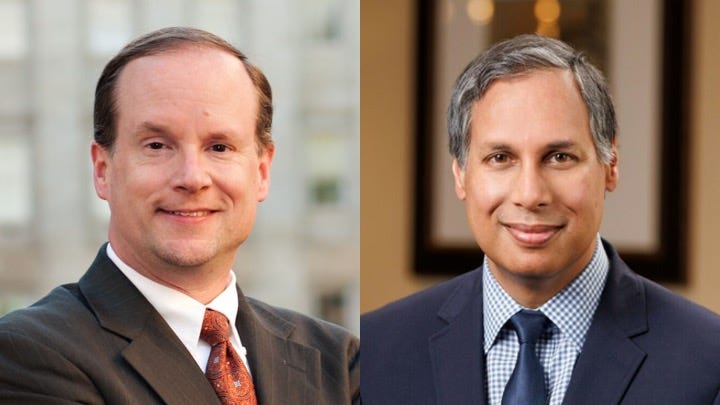FreeCon: Year One
A progress report for Freedom Conservatism — and next steps
A year ago this week, 83 leaders from across the American Right announced the Freedom Conservatism project and released our Statement of Principles. “Authoritarianism is on the rise both at home and abroad,” we wrote. “More and more people on the left and right reject the distinctive creed that made America great: that individual liberty is essential to the moral and physical strength of the nation.”
Our goal was ambitious: to build an American conservatism capable of governing our great country. Fortunately, Freedom Conservatives need not start from scratch. We need only apply the timeless principles of liberty to the challenges of the 21st century.
Final cause
America’s Founders did their work well. The principles affirmed in our Declaration of Independence remain the country’s unifying creed. The architecture of institutions, powers, and rights laid out in our federal and state constitutions remains the best yet designed to govern a free and responsible people.
As President Calvin Coolidge so memorably observed in 1926, “If all men are created equal, that is final. If they are endowed with inalienable rights, that is final. If governments derive their just powers from the consent of the governed, that is final.
“No advance, no progress can be made beyond these propositions. If anyone wishes to deny their truth or their soundness, the only direction in which he can proceed historically is not forward, but backward toward the time when there was no equality, no rights of the individual, no rule of the people.
“Those who wish to proceed in that direction cannot lay claim to progress. They are reactionary. Their ideas are not more modern, but more ancient, than those of the Revolutionary fathers.”
Where Progressives and Populists go wrong
Freedom Conservatives harbor no personal animus for progressives on the Left or populists on the Right. We seek to engage them constructively as fellow Americans. But we think they commit the very error Coolidge described. We think they are profoundly mistaken about our country’s past, present, and future.
Progressives place too much faith in central planners and too little faith in the private associations of family, faith, community, and enterprise that form civil society.
Populists place too much faith in charismatic leaders and too little faith in competition, innovation, personal freedom, and personal responsibility.
Both groups seek to empower national government at the expense of states, communities, households, and individuals. Both groups practice the politics of grievance and division at the expense of republican virtue and true self-government.
Both overstate the country’s very real problems, asserting incorrectly that incomes have been going down for most Americans and that “free market fundamentalism” is to blame. In reality, our economic challenges are primarily the result of disastrous public policies — fiscal recklessness, overregulation, and the collusion of government and crony capitalists — while our moral and social ills will be best remedied by strengthening families and civil society, not supplanting them.
No dreams or schemes
What do FreeCons stand for? One of our organizers, John Hood, put it this way in a July 13, 2023 column announcing the Freedom Conservatism project: “We offer real solutions to pressing problems, not utopian dreams or authoritarian schemes.
“We believe in free enterprise, free trade, free speech, strong families, balanced budgets, and the rule of law. We champion equal protection and equal opportunity. We think Washington has too much power and our states, communities, private associations, and households have too little. We believe Americans are safest and freest in a peaceful world that is led by a United States committed to pursuing its just interests.”
Another leader of the project, Avik Roy, wrote a piece spotlighting three passages from the Statement of Principles in which signatories made explicit commitments.
First, FreeCons commit to free-market reforms that lower the cost of living, particularly for such goods and services as food, shelter, health care, higher education, and energy.
Second, FreeCons commit to “building a constructive reform agenda that can restore America’s fiscal sustainability, ensuring that future generations inherit a more prosperous and secure nation than the one we now inhabit.”
Third, FreeCons commit to “expanding opportunity for those who face challenges due to past government restrictions” while also adamantly opposing “racial discrimination in all its forms, either against or for any person or group of people.”
In his piece, Roy wrote that FreeCons seek to “rebuild a majority coalition for the idea that has done more to expand social mobility than any other: individual liberty.”
Community of leaders
Freedom Conservatism is a broad, vibrant network of leaders representing many communities, disciplines, and roles in our movement.
As of this writing, 253 FreeCons have signed the statement. We’ve profiled many of them here at FreedomConservatism.org, and will continue to feature the work of our signatories on such issues as education, health care, housing policy, poverty, family stability, energy and the environment, tax and regulatory reform, fiscal restraint, and national defense.
Among our FreeCon signatories are:
Former elected and appointed officials in federal, state, and local government.
Editors and writers for such publications as National Review, The Washington Examiner, The Wall Street Journal, The Dispatch, The Washington Free Beacon, FUSION, Law & Liberty, The Bulwark, The American Spectator, American Habits, and National Affairs.
Hosts and contributors for such networks as ABC, CNN, NPR, and Fox News.
Executives and analysts at such prominent think tanks as the American Enterprise Institute, the Economic Policy Innovation Center, the Foundation for Research on Equal Opportunity, and the Competitive Enterprise Institute.
Teachers and scholars on such campuses as Stanford, Duke, Berkeley, North Carolina State, Florida State, Tulane, Cornell, Clemson, George Washington, Alabama, Arkansas, West Virginia, Liberty, Catholic, George Mason, Ava Maria, Hillsdale, and Grove City.
Litigators who fight for liberty, justice, and the constitutional order in courthouses across the country.
Policy leaders and activists in such states as California, Florida, Illinois, Pennsylvania, Massachusetts, Arizona, Washington, Georgia, North Carolina, Wisconsin, Colorado, Minnesota, New Hampshire, Kentucky, Kansas, Louisiana, and Michigan.
What’s next?
During the first year of the Freedom Conservatism project, we focused on laying the groundwork and establishing our brand. Over the coming year, we’ll be pivoting to a more activist, public-facing role.
We’ll certainly continue to add new signatories to the FreeCon statement and promote their work through our Substack and social-media feeds. We’ll also keeping hosting private gatherings of FreeCons for online and face-to-face conversation.
But you’ll see a lot more articles, media interviews, and public appearances that promote a compelling vision of Freedom Conservatism and apply its general principles to specific political issues and policy problems.
While some of this content is already in development, we welcome any ideas you might have. John Hood is our point person for this effort, so feel free to email him at John.Hood@jwpf.org.
As for public events, we plan to host our first Freedom Conservatism Conference in Washington, D.C in early 2025. After that, we will hold FreeCon Forums in communities across the country to strengthen regional networks of like-minded activists and spotlight success stories of Freedom Conservatism in action at the state and local level. To receive updates about these and other FreeCon programs, you should become a (free) subscriber if you haven’t already done so:
Good to Great
Ideas can, indeed, have consequences — but there’s nothing automatic about the process. American conservatism has always championed potent ideas. It hasn’t always enjoyed influence.
Shaping and implementing policy requires more than sound ideas. It requires a careful investment of time and resources. It requires well-run institutions and robust networks of thinkers, donors, and doers.
That’s what our project is all about: building relationships and fostering collaboration among our ever-growing ranks of Freedom Conservatives. Our signatories and allies are already doing good work in policy analysis, journalism, scholarship, education, litigation, public administration, and electoral politics. Together, we can do the great work of leading the American Right to unprecedented influence and effective governance of our republic.
Thanks for joining us. It is a privilege to fight alongside you.


